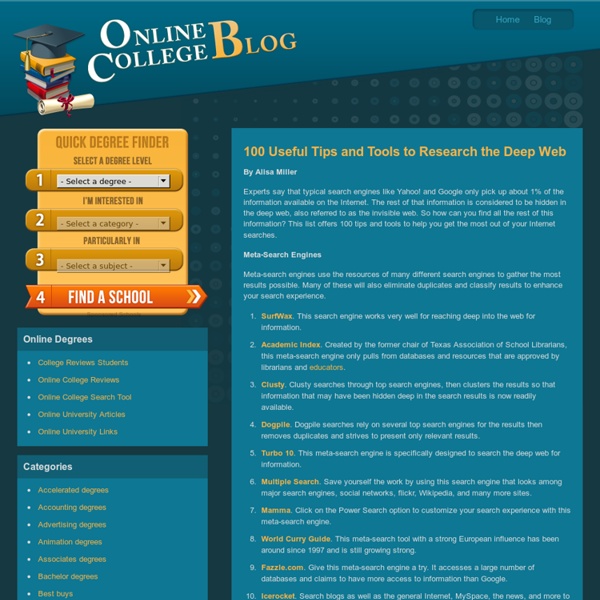How-To Find Files In Unprotected Directories
We’ve all got a little voyeurism in us. That’s a big reason why the post, Clearing Google Search History to Maintain Your Privacy sent my visitor counts off the charts :). In this article, I’m going to show you how to create search queries that will list the contents of unprotected directories on the internet. You’ll be able to play the music files, watch the videos, look at photos and more. I have to say, it’s really addicting. First of all, what’s an unprotected web directory?
10 Search Engines to Explore the Invisible Web
Not everything on the web will show up in a list of search results on Google or Bing; there are lots of places that their web crawlers cannot access. To explore the invisible web, you need to use specialist search engines. Here are our top 12 services to perform a deep internet search.
Invisible Web: 99 Resources
College researchers often need more than Google and Wikipedia to get the job done. To find what you're looking for, it may be necessary to tap into the invisible web, the sites that don't get indexed by broad search engines. The following resources were designed to help you do just that, offering specialized search engines, directories, and more places to find the complex and obscure. Search Engines
Let them Find us
<div class='message error'><strong>Javascript Disabled Detected</strong><p>You currently have javascript disabled. Several functions may not work. Please re-enable javascript to access full functionality.</p></div><br /> Advertisement
News aggregator - Wikipedia
Function[edit] Visiting many separate websites frequently to find out if content on the site has been updated can take a long time. Aggregation technology helps to consolidate many websites into one page that can show the new or updated information from many sites. Aggregators reduce the time and effort needed to regularly check websites for updates, creating a unique information space or personal newspaper. Once subscribed to a feed, an aggregator is able to check for new content at user-determined intervals and retrieve the update.
Deep Web Search - A How-To Site
Where to start a deep web search is easy. You hit Google.com and when you brick wall it, you go to scholar.google.com which is the academic database of Google. After you brick wall there, your true deep web search begins. You need to know something about your topic in order to choose the next tool. To be fair, some of these sites have improved their index-ability with Google and are now technically no longer Deep Web, rather kind-of-deep-web.
The Ultimate Chaos Bringer's Blog: A wealth of information about Deep Web (56K WARNING; ALSO DISTURBING CONTENT)
First of all, those of you who come across this post undoubtedly want to know just what the fuck the Deep Web is... This article should help to explain it a little bit.. The deep web is usually defined as the content on the Web not accessible through a search on general search engines. This content is sometimes also referred to as the hidden or invisible web.The Web is a complex entity that contains information from a variety of source types and includes an evolving mix of different file types and media.
The Ultimate Guide to the Invisible Web
Search engines are, in a sense, the heartbeat of the internet; “Googling” has become a part of everyday speech and is even recognized by Merriam-Webster as a grammatically correct verb. It’s a common misconception, however, that Googling a search term will reveal every site out there that addresses your search. Typical search engines like Google, Yahoo, or Bing actually access only a tiny fraction — estimated at 0.03% — of the internet. The sites that traditional searches yield are part of what’s known as the Surface Web, which is comprised of indexed pages that a search engine’s web crawlers are programmed to retrieve. "As much as 90 percent of the internet is only accessible through deb web websites."
7 Things You Should Know About Tor
Updated: July 1st at 6:30PM to add information about traffic correlation attacks. We posted last week about the Tor Challenge and why everyone should use Tor. Since we started our Tor Challenge two weeks ago we have signed up over 1000 new Tor relays. But it appears that there are still some popular misconceptions about Tor. We would like to take this opportunity to dispel some of these common myths and misconceptions. 1.
How iPads in the Classroom Enhance Learning
While some educational professionals still show ambivalent emotions about the use of technology in the classroom, the truth is that technology is becoming more important by the day in American Society. It is important to adapt to the dynamic ways in which education is being transmitted. According to Open Colleges, both teachers and students feel that tablet usage can augment school learning. 81% of U.S teachers think tablets can help enhance classroom learning.86% of students believe tablets can help them to study more efficiently.59% of students would like the implementation of BYOD to enhance their learning.
Beginners Guide to Mining Bitcoins
Last updated on December 18th, 2017 at 06:06 pm One of the biggest problems I ran into when I was looking to start mining Bitcoin for investment and profit was most of the sites were written for the advanced user. I am not a professional coder, I have no experience with Ubuntu, Linux and minimal experience with Mac. So, this is for the individual or group that wants to get started the easy way.




Hi The very last tip (#100 about the deep web) leads to That domain is *for sale*! And that's all the information it provides... So an update would be nice. :) Harrie by harricot Sep 14